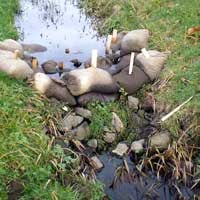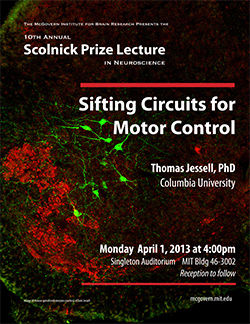Thomas Jefferson receives over 40 million in National Institute of Health (NIH) research funding each year. One of the projects supported by the NIH since 2011 has been an investigation into DNA viruses. This study recently yielded new insight into the two states of a viral protein and revealed its function as a DNA-sensor. This finding may serve as a road map for developing anti-viral therapy for pathogenic DNA viruses.
Read More
Tags:
Pennsylvania,
Thomas Jefferson University,
NIH funded Research Projects,
Research Funding,
Northeast Region,
ThomJeff,
TJU,
viruses
Dr. Madelaine Bartlett, a biologist at the University of Massachusetts in Amherst, recently received a four-year $4 million grant from the National Science Foundation. The new research funding will allow Barlett and colleagues from UMass and other institutions to study the genes that regulate plant stem cell biology and their effect on fruit size and yield.
Read More
Tags:
Stem cell research,
University of Massachusetts Amherst,
University of Massachusetts,
agriculture,
new research funding,
Massachusetts,
agricultural,
MA,
Northeast Region,
UMASS,
new research grant,
NSF funding,
NSF grant,
NSF award,
Plant Biology,
agricultural business,
agribusiness
Researchers from the Icahn School of Medicine at Mount Sinai have been awarded a grant of more than $9 million by the NIH to research the effects of environmental exposures on children’s long-term health. The grant is part of Environmental Influences on Child Health Outcomes (ECHO), a seven-year program that aims to understand the effects of environmental exposures on child health and development.
Read More
Tags:
environmental contaminants,
New York,
Environment,
NY,
Northeast Region,
Mt. Sinai,
Icahn School of Medicine
The National Institute of Mental Health recently awarded a $2.3M Biobehavioral Research Award for Innovative New Scientists (BRAINS) grant to Dr. Matthew D. Lerner, an assistant professor in the Department of Psychology at Stony Brook University. The grant will provide funding for Dr. Lerner's project, “Optimizing Prediction of Social Deficits in Autism Spectrum Disorders,” a study which aims to help youth with autism overcome social challenges.

Read More
Tags:
Stony Brook University,
Autism,
Research Funding,
NY,
Northeast Region,
NIH grant,
Stony Brook,
BioResearch Product Faire™

Neuroscientists at Rockefeller University in New York will be making breakthroughs in a brand new institute, according to a recent announcement from the university and the Kavli Foundation. The new Kavli Neural Systems Institute (Kavli NSI) will be located at Rockefeller University, thanks in part to a $20 million endowment supported equally by Kavli and Rockefeller.
Read More
Tags:
Rockefeller University,
East Coast Bioscience Shows,
New York,
Neuroscience,
RockU,
Research Funding,
NY,
New York City,
Northeast Region,
NIH funding,
2016,
BioResearch Product Faire™,
Kavli Institute
 For over 50 years, Stony Brook University in New York has been a venue for thousands of groundbreaking discoveries made by prominent medical researchers and clinicians.
For over 50 years, Stony Brook University in New York has been a venue for thousands of groundbreaking discoveries made by prominent medical researchers and clinicians.
Read More
Tags:
Lyme Disease,
cancer research,
New York,
Stony Brook University,
2015,
Pediatric Research,
Research Funding,
NY,
Northeast Region,
Stony Brook,
research grants,
SunySB
 In collaboration with researchers at The Scripps Research Institute, Weill Cornell Medical College, and other institutions, scientists at Rockefeller University are working to harness the natural potential of the human immune system to develop a series of sequential vaccinations against the HIV virus.
In collaboration with researchers at The Scripps Research Institute, Weill Cornell Medical College, and other institutions, scientists at Rockefeller University are working to harness the natural potential of the human immune system to develop a series of sequential vaccinations against the HIV virus.
Read More
Tags:
Rockefeller University,
Bioresearch,
HIV,
Bioscience,
infectious diseases,
New York,
2015,
disease research,
RockU,
BioResearch Product Faire Event,
NY,
NIH,
Northeast Region,
AIDS vaccine research,
life science tradeshows
 Mycology is the branch of biology devoted to the study of fungi (mushrooms), which, we're increasingly learning, are truly astonishing in what they can do. With the support of a grant from the EPA, a team of Washington State University scientists is developing a mycofiltration system to purify storm water of bacteria before it re-enters the urban water supply. Professor Marc Beutel is an environmental engineer who has joined forces with renowned mycologist Paul Stamets of Fungi Perfecti, a research laboratory and retail company also in Washington State. Together they have completed the first phase of a study titled Mycofiltration Biotechnology for Pathogen Management, wherein they have successfully used fungi to create a "living net" to filter effluent bacteria. The project was funded by an EPA Small Business Innovative Research (SBIR) award.
Mycology is the branch of biology devoted to the study of fungi (mushrooms), which, we're increasingly learning, are truly astonishing in what they can do. With the support of a grant from the EPA, a team of Washington State University scientists is developing a mycofiltration system to purify storm water of bacteria before it re-enters the urban water supply. Professor Marc Beutel is an environmental engineer who has joined forces with renowned mycologist Paul Stamets of Fungi Perfecti, a research laboratory and retail company also in Washington State. Together they have completed the first phase of a study titled Mycofiltration Biotechnology for Pathogen Management, wherein they have successfully used fungi to create a "living net" to filter effluent bacteria. The project was funded by an EPA Small Business Innovative Research (SBIR) award.
Tags:
2014,
2013,
Washington,
WashU,
mycofiltration,
WA,
Northwest,
WSU,
Washington State University,
BioResearch Product Faire Event,
Biotechnology,
biotech industry,
Front Line event,
Northeast Region,
Pullman
 Dr. Thomas Jessell is a developmental neurobiologist at Columbia University Medical Center and the latest recipient of the Scolnick Prize in Neuroscience, which includes a $100,000 award. In the Jessell Lab in the Hammer Health Sciences Building, researchers study the vertebrate central nervous system to understand how neurons become encoded at the embryonic level, particularly in the spinal cord. The Scolnick Prize singles out Jessell's work for identifying signaling molecules and transcriptional code that establish a linkage between functional circuitry and motor behavior. Also a member of Columbia's Motor Neuron Center, which is dedicated to the study of motor neuron diseases like ALS, Dr. Jessell is a faculty member in the Department of Biochemistry and Molecular Biophysics, a Howard Hughes Medical Institute investigator, and part of the larger Columbia Neuroscience interdisciplinary research community. He will travel to Boston in April to accept the prize and deliver a lecture (see image at right). The Scolnick Prize is given out by the McGovern Institute for Brain Research at MIT. According to McGovern chairman Robert Desimone, from a recent CUMC press release:
Dr. Thomas Jessell is a developmental neurobiologist at Columbia University Medical Center and the latest recipient of the Scolnick Prize in Neuroscience, which includes a $100,000 award. In the Jessell Lab in the Hammer Health Sciences Building, researchers study the vertebrate central nervous system to understand how neurons become encoded at the embryonic level, particularly in the spinal cord. The Scolnick Prize singles out Jessell's work for identifying signaling molecules and transcriptional code that establish a linkage between functional circuitry and motor behavior. Also a member of Columbia's Motor Neuron Center, which is dedicated to the study of motor neuron diseases like ALS, Dr. Jessell is a faculty member in the Department of Biochemistry and Molecular Biophysics, a Howard Hughes Medical Institute investigator, and part of the larger Columbia Neuroscience interdisciplinary research community. He will travel to Boston in April to accept the prize and deliver a lecture (see image at right). The Scolnick Prize is given out by the McGovern Institute for Brain Research at MIT. According to McGovern chairman Robert Desimone, from a recent CUMC press release:
Tags:
2014,
2013,
Northeast,
Scolnick Prize,
New York,
Columbia University,
Neuroscience,
Columbia,
BioResearch Product Faire Event,
Research,
Stem Cell,
New York City,
Columbia University Medical Center,
Northeast Region,
lab supplier,
NYColumbia University
Lab scientists at the University of Pittsburgh Cancer Institute and UP's Center for Biologic Imaging have recently published an important paper in the Journal of Cell Science that sheds light on a novel method of interrupting mitosis in a cell by effectively depriving its mitochondria of a key protein. The resulting replication stress means cancer cells are stopped from successfully multiplying. Colorful images of the targeted cells actually show them stuck in anaphase trying to divide and subsequently tearing themselves apart. By identifying a compound that carries out this protein interference and disrupts normal mitochondrial fission, researchers have identified a promising therapeutic avenue for halting cancer growth.
Tags:
2014,
2013,
University of Pittsburgh,
Pennsylvania,
Northeast,
Hillman Cancer Center,
cancer research,
cell biology,
Microscopy,
UPITT,
Cell Research,
BioResearch Product Faire Event,
PA,
NIH,
Pittsburgh,
Northeast Region



 For over 50 years,
For over 50 years, 

